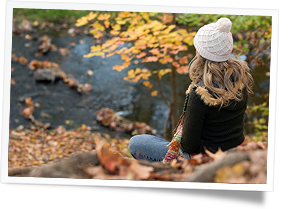Winter’s Challenges and Cleansing
Sunday, December 25th, 2022
by Douglas L. Anderson, PsyD
Plains Indians have a rich culture. Probably the most notable feature - an aspect of the culture that most people have some awareness of - is the reference to the four directions. The four directions are marked by specific colors, and each direction is associated with certain beliefs or understandings.
The Winter Solstice (Dec. 21) marks the official beginning of Winter (although Mother Nature introduced Winter a bit early this year!). North is the direction associated with this time of year. St. Joseph’s Indian School describes the significance of this direction on its website:
“North brings the cold, harsh winds of the winter season. These winds are cleansing. They cause the leaves to fall and the earth to rest under a blanket of snow. If someone has the ability to face these winds like the buffalo with its head into the storm, they have learned patience and endurance. Generally, this direction stands for hardships and discomfort. Therefore, North represents the trials people must endure and the cleansing they must undergo.”
Long before colonization severely disrupted the lives of the Indigenous people across the Great Plains, wisdom emerged from the Indigenous culture. They understood that everyone and everything is related. And they made use of this understanding when honoring and praying to the four directions.
The Indigenous people of the Plains saw the importance and value of Winter, and the Winter Solstice was a day of giving thanks as a result. They were grateful for having the supplies they needed to survive the Winter. They were grateful for the snow that made hunting a bit easier. They realized that Winter brought a time of rest and recovery to the earth.
They also recognized that human beings needed a time of rest and recovery following the experiences of hardship and discomfort that life throws our way. Short days and long cold nights generated a contemplative and meditative opportunity, and personal reflection was a normal part of Winter for Indigenous people.
Maybe we can take some lessons from this. Today we have warm homes and ample sources of light. We have television and a host of online options to entertain ourselves and distract us from our discomforts and hardships. As wonderful as it is to have the benefits that exist in 2022, maybe we need to be more intentional about taking time this Winter to be more reflective, to pursue personal growth and community growth, and to appreciate the cleansing effect of Winter.
A healthy life is not one that is free of challenges, but rather one that includes adequate time and intentional effort to reflect on and grow from and through the challenges life sends our way. None of us are free of difficulties in this world, and we all need to come to terms with that. One theorist describes this as “radical acceptance.”
One source defined radical acceptance this way: “Radical acceptance is when you stop fighting reality, stop responding with impulsive or destructive behaviors when things aren't going the way you want them to, and let go of bitterness that may be keeping you trapped in a cycle of suffering.”
I think the Indigenous people understood this principle thousands of years before a psychology theorist came up with the phrase. Winter and its stiff northern winds could contribute to misery alone, or could be viewed as a needed cleansing with the hope of new life come Spring. I encourage you to welcome Winter and Winter’s challenges. Learn the lessons it has to teach you.
If you want or need someone to journey with you as you deal with life’s challenges, we have competent and caring therapists in all four of our locations - River Counseling Services in Platte, Sioux Falls Psychological Services, and Stronghold Counseling Services in Sioux Falls and in Yankton - who will meet you where you are, offering hope. That is our mission. You may schedule an appointment at the Platte office at 605-337-3444 or meet with one of our Sioux Falls or Yankton based therapists from your computer, smartphone, or in person at any of our clinics. To schedule an appointment, please call 605-334-2696.




